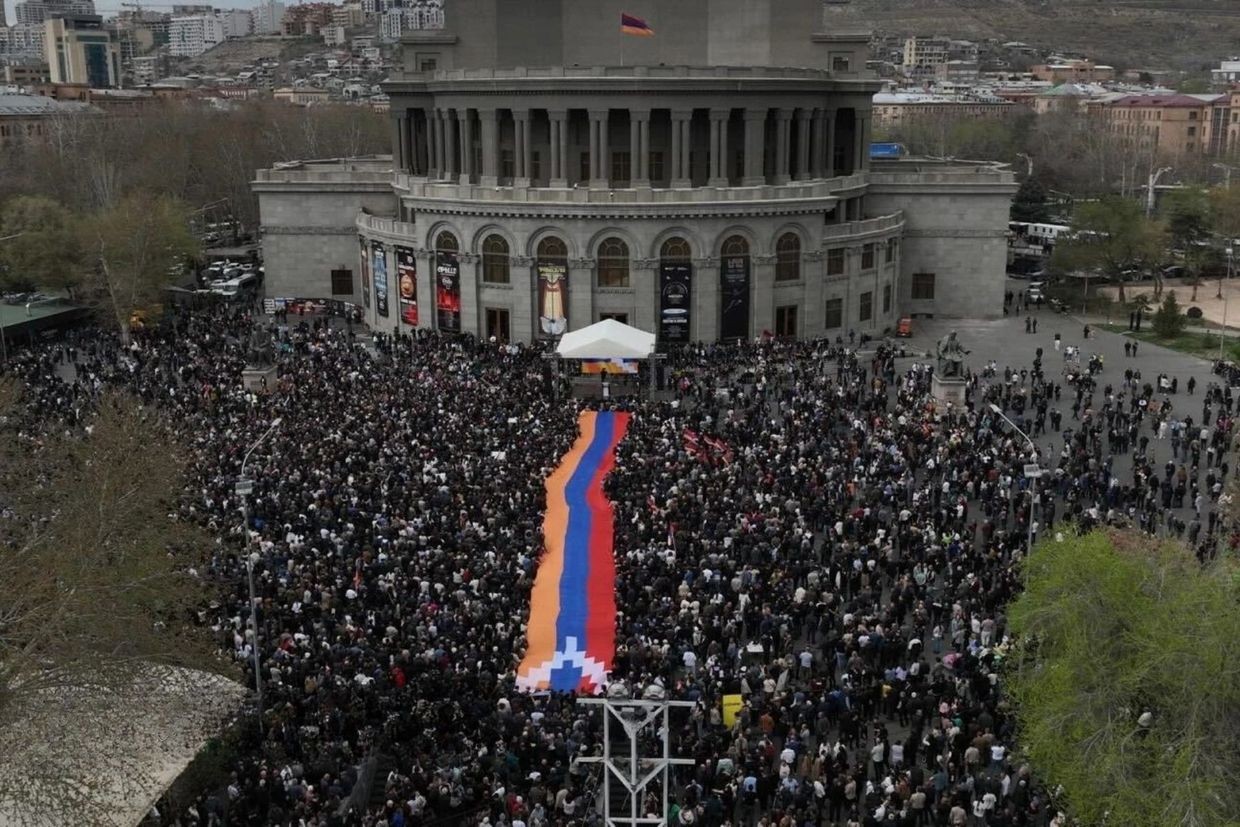Nagorno-Karabakh Armenians subjected to hate speech following their ongoing protests

Following a major rally on 29 March — and a subsequent series of protests against the cuts of social support provided to the refugees — a new round of hate speech has been launched against Nagorno-Karabakh Armenians, mainly coming from Armenian officials, their affiliated media, and influencers.
On Wednesday, Civil Contract MP Maria Karapetyan dismissed accusations that the Armenian government had incited hate speech, despite multiple instances of ruling party MPs, government employees, affiliated media outlets, and influencers targeting Nagorno-Karabakh Armenians online.
In an interview with RFE/RL, Karapetyan claimed that the government's ‘plans, thoughts, feelings’ towards displaced Nagorno-Karabakh Armenians were ‘reflected in the government’s decisions, programmes, and way of speaking’.
‘Just like how [the government] speaks during a government session, that is our approach to this issue’, Karapetyan said.
However, on the same day as Karapetyan’s interview, another prominent ruling party member targeted the refugees.
In a post on Telegram, Parliamentary Speaker Alen Simonyan shared a short video of an elderly man allegedly from Nagorno-Karabakh who called Simonyan ‘an animal’ and said that he had ‘a Turkish blood’, for which reason Simonyan ‘does not like the Armenian nation’.
In his response, Simonyan not only accused the man of being paid to make such a statement, and used the case to attack other Nagorno-Karabakh Armenians living as refugees in Armenia.
‘People like him are being activated — yesterday, today, and tomorrow — to try to undermine and blow up [...] Armenia from within. Don’t look at the Armenian people with one eye — what you did in [Nagorno-Karabakh] won’t work in Armenia’.
Since the big rally at the end of March, the government has appeared to be disturbed by the ongoing protests, making similar accusations towards refugees as Simonyan, while additionally using insulting language.
On 29 March, the day of the rally, the Deputy Chief of the Prime Minister’s staff, Taron Chakochyan, posted on Facebook that the opposition, ‘considering it impossible to come to power through elections’, uses the displaced Nagorno-Karabakh Armenians as ‘cannon fodder’.
He further claimed that the social issues which were being raised by the refugees, were ‘in reality, serving long-term political goals, up to and including regime change’.
On Wednesday, Roman Yertsyan, a lawyer originally from Nagorno-Karabakh, announced that he had appealed to the Armenian Investigative Committee to examine one such post on Facebook under an article in the criminal code focused on public speech aimed at inciting or promoting hatred, discrimination, intolerance, or hostility.
The post was made by user Arsen Ars Arshakyan, who has over 6,000 followers and generally posts pro-government content.
Arshakyan called the information that 30% of Nagorno-Karabakh Armenians left Armenia ‘good news’, and further noted, ‘God willing, may they never return, and may it be continuous’.
The mounting ‘discrimination and hate speech’ has been ‘strongly condemn[ed]’ by Armenian Human Rights Defender Anahit Manasyan.
In a statement on Wednesday, Manasyan noted that ‘this is strictly unacceptable in the context of fostering public solidarity and preventing the polarisation of society’.
That same day, the last Human Rights Defender of Nagorno-Karabakh, Gegham Stepanyan, enumerated several cases when, after officials or their relatives insulted Nagorno-Karabakh Armenians, the same people apologised or amended their thoughts.
‘All of this is the result of public condemnation and reproach. And that shows that, overall, the Armenian public is not at peace with the hate propaganda directed against the people of Artsakh [Nagorno-Karabakh]. Therefore, dear people of Artsakh, we must never generalise, nor should we pour water on the mill of those who generate hatred’, Stepanyan wrote.
Other similar cases of hate speech against the refugees following the 29 March rally have been covered by local media, which were then shared and highlighted by Nagorno-Karabakh Armenians. In some cases, Armenian fact-checkers refuted the allegations, proving them to be baseless.
However, even before the rally, refugees were targeted by officials and their affiliates.
Notably, in its latest report on Armenia, the US civil rights group Freedom House noted that ‘Nagorno-Karabakh refugees and activists have reported instances of mistreatment by authorities or hostile speech from government representatives’.
In a talk with CivilNet, political and media experts offered various reasons behind such an approach, including the general affiliation of the refugees with Armenia’s former presidents Robert Kocharyan and Serzh Sargsyan, who are originally from Nagorno-Karabakh. They are also currently the main opposition figures with their political forces having made several failed attempts to topple Pashinyan’s government.
Additionally, the experts offered that the authorities use the ‘divisive narratives’ when domestic political issues arise, or they portray the refugees as a ‘disruptive foreigner’, with foreign and mainly Russian ties to consolidate the larger society around the government.











